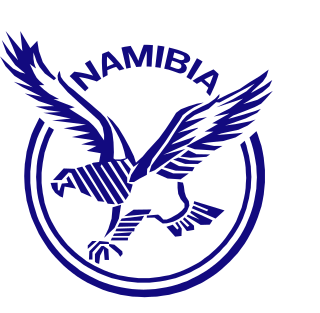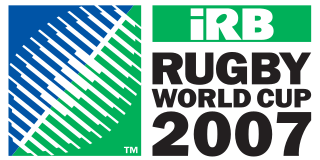
The Rugby World Cup is a men's rugby union tournament contested every four years between the top international teams. The tournament was first held in 1987, when the tournament was co-hosted by New Zealand and Australia.
The 1999 Rugby World Cup was the fourth Rugby World Cup, the quadrennial international rugby union championship. It was principally hosted by Wales, and was won by Australia. This was the first Rugby World Cup to be held in the sport's professional era.

The Namibia national rugby union team, nicknamed the Welwitschias or Biltongboere, are a tier-two nation in the World Rugby tier system, and have participated in five Rugby World Cup competitions since their first appearance in 1999. They are governed by the Namibia Rugby Union.

The 2007 Rugby World Cup was the sixth Rugby World Cup, a quadrennial international rugby union competition inaugurated in 1987. Twenty nations competed for the Webb Ellis Cup in the tournament, which was hosted by France from 7 September to 20 October. France won the hosting rights in 2003, beating a bid from England. The competition consisted of 48 matches over 44 days; 42 matches were played in ten cities throughout France, as well as four in Cardiff, Wales, and two in Edinburgh, Scotland.
The 1987 Rugby World Cup was the first Rugby Union World Cup. New Zealand and Australia agreed to co-host the tournament. New Zealand hosted 20 matches – 17 pool stage matches, two quarter-finals and the final – while Australia hosted 12 matches – seven pool matches, two quarter-finals and both semi-finals. The event was won by co-hosts New Zealand who were the strong favourites, and won all their matches comfortably. France were losing finalists, and Wales surprise third-place winners: Australia, having been second favourites, finished fourth after conceding crucial tries in the dying seconds of both the semi-final against France and the third-place play-off against Wales.
The 2007 Africa Cup was the eighth edition of highest level rugby union tournament in Africa. The competition involved twelve teams that were divided into two zones. Each zone was then divided into two pools of three. Each pool winner then qualified for a semi-final; the semi-final winners then played each other in the final.
The 2008-2009 Africa Cup is the ninth edition of highest level rugby union tournament in Africa. The competition involves twelve teams that are divided into two zones. Each zone is then divided into two pools of three. Each pool winner then qualifies for a semi-final; the semi-final winners then play each other in the final.

In the African Regional Qualifying Process, 14 of the 15 eligible IRB member nations took part.

The Africa Women's Sevens is the continental championship for women's international rugby sevens in Africa. The tournament sanctioned and sponsored by Rugby Africa which is the rugby union governing body for the continent.

Theuns Andries Willem 'Worsie' Kotzé is a Namibian international rugby union player, currently playing with the Welwitschias in South African domestic rugby. He is a utility back that can play as a scrum-half, fly-half or fullback, but is best known for playing as a fly-half for Namibia in the Rugby World Cup tournaments in 2011 and 2015.
The 2014 SARU Community Cup was the second season of the SARU Community Cup competition. The qualification to the tournament took place in 2013, while the competition proper was contested in 2014. The tournament is the top competition for non-university rugby union clubs in South Africa.

The European Rugby Challenge Cup is an annual European rugby union competition organised by European Professional Club Rugby (EPCR). It is the second-tier competition for European clubs behind the European Rugby Champions Cup. From its inception in 1996 to 2014, it was known as the European Challenge Cup and governed by European Rugby Cup (ERC). Following disagreements in the structure of the tournament's format and division of revenue, the English and French leagues withdrew to form the EPCR, which has organized the Challenge Cup and the Champions Cup since the 2014–15 season.

Villagers Worcester Rugby Football Club – known as One Logix United Bulk Villagers Worcester for sponsorship reasons – is an amateur rugby union club based in Worcester, South Africa. They are a member of the Boland Rugby Union and can provide players to the Boland Cavaliers provincial team.
Of the twenty-four nations involved in 1993 Rugby World Cup Sevens, nineteen were invited and five had to go through pre-tournament 1993 Rugby World Cup Sevens qualifying. Four of the qualification places were won by Namibia, Hong Kong, Taiwan and Spain who booked their places by reaching the semi-finals of one qualifying event in Sicily. Latvia won their place by beating Russia in the final of a mini-tournament staged in Moscow to decide who would replace the USSR, which had broken up since its invite to the world cup.
The 2017 Gold Cup was the second season of the Gold Cup competition since its name change, having previously been known as the Community Cup. The competition was the top competition for non-university rugby union clubs in South Africa, Namibia and Zimbabwe.
The 2017–18 European Rugby Challenge Cup was the fourth edition of the European Rugby Challenge Cup, an annual second-tier rugby union competition for professional clubs. It was also the 22nd season of the Challenge Cup competition in all forms, following on from the now defunct European Challenge Cup. Clubs from six European nations plus two Russian club will competed for the title.
The 2018–19 European Rugby Challenge Cup is the fifth edition of the European Rugby Challenge Cup, an annual second-tier rugby union competition for professional clubs. Including the predecessor competition, the original European Challenge Cup, this is the 23rd edition of European club rugby's second-tier competition. Clubs from five of the nations that participate in the Six Nations Championship, with Scotland as the only exception, plus Romania and Russia are competing.
The 2019 Gold Cup will be the 2019 edition of the Gold Cup, an annual rugby union competition held in South Africa between the top non-university club teams of the South African Rugby Union's constituent provincial unions. The competition will be the third edition of the competition since its name change in 2016 and the sixth edition since it was launched as the Community Cup in 2013.














